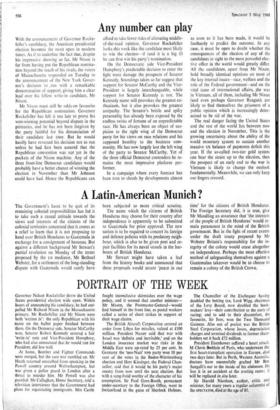Any number can play
With the announcement of Governor Rocke- feller's candidacy, the American presidential election becomes the most open in modem times. As if to underline the fact that, despite his impressive showing so far, Mr Nixon is far from having put the Republican nomina- tion beyond the reach of his rivals, the voters of Massachusetts responded on Tuesday to the announcement of the New York Gover- nor's decision to _run with a remarkable demonstration of support, giving him a clear lead over his fellow write-in candidate, Mr Nixon.
Mr Nixon must still be odds-on favourite for the Republican nomination. Governor Rockefeller has left it too late to prove his vote-winning potential beyond dispute in the primaries, and he has not been forgiven by the party faithful for his denunciation of their candidate last time. But he would hardly have reversed his decision not to run unless he had first been assured that the Republican convention was nor yet in the pockets of the Nixon machine. Any of the three front-line Democrat candidates would probably have a better chance of winning the election in November than Mr Johnson could have had. Hence the Republicans can afford to take fewer risks of alienating middle- of-the-road opinion. Governor Rockefeller looks this week like the candidate most likely to win the election—if (and it is a big if) he can first win his party's nomination.
On the Democratic side Vice-President Humphrey's predictable decision to enter the fight must damage the prospects of Senator Kennedy. Soundings taken so far suggest that support for Senator McCarthy and the Vice- President is largely interchangeable, while support for Senator Kennedy is not. The Kennedy name still provokes the greatest en- thusiasm, but it also provokes the greatest antipathy. The Senator's brittle and spiky personality has already been exposed by the endless twists of fortune of an unpredictable race. He has always been an object of sus- picion to the right wing of the Democrat party for his views on race relations and his supposed hostility to the business com- munity. He has now largely lost the left wing of the party to Senator McCarthy. Yet of the three bfficial Democrat contenders he re- mains the most impressive platform per- former.
In a campaign where every forecast has been torn to shreds by developments almost as soon as it has been made, it would be foolhardy to predict the outcome. In any case, it must be open to doubt whether the consequences of the election of any of the candidates in sight to the most powerful elec- tive office in the world would greatly_differ. All the candidates, apart from Mr Nixon, bold broadly identical opinions on most of the key internal issues—race, welfare and the role of the Federal government—and on the vital issue of international affairs, the war in Vietnam, all of them, including Mr Nixon (and even perhaps Governor Reagan), are likely to find themselves the prisoners of a public opinion which is increasingly deter- mined to be rid of the war.
The real danger facing the United States and the rest of the world lies between now and the election in November. This is the growing uncertainty about the ability of the world monetary system to sustain another massive us balance of payments deficit this year. If the so-called two-tier gold system can bear the strain up to the election, then the prospect of an early end to the war in Vietnam is likely to change the outlook fundamentally. 'Meanwhile, we can only keep our fingers crossed.






































 Previous page
Previous page